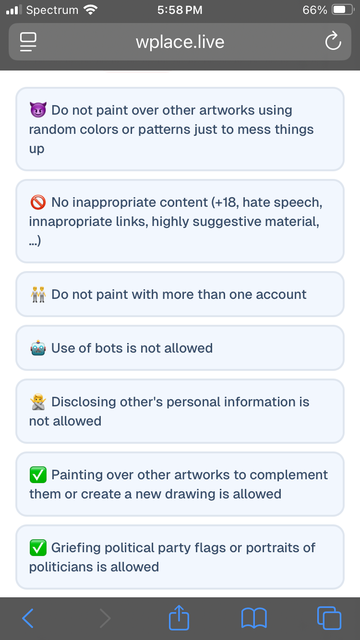Welcome to DU!
The truly grassroots left-of-center political community where regular people, not algorithms, drive the discussions and set the standards.
Join the community:
Create a free account
Support DU (and get rid of ads!):
Become a Star Member
Latest Breaking News
Editorials & Other Articles
General Discussion
The DU Lounge
All Forums
Issue Forums
Culture Forums
Alliance Forums
Region Forums
Support Forums
Help & Search
The Way Forward
Related: About this forumIs this how young people are leading the way in art/protest?
Wplace Is Exploding Online Amid a New Era of Youth ProtestFrom pixel art to political vigils, this beautifully chaotic internet project is showing how young people are reinventing protest.
KRISTIE DE GARIS
AUG 12, 2025
https://kristiedegaris.substack.com/p/wplace-is-exploding-online-amid-a-new-era-of-youth-protest
Long.
Brief summary here. Try!
WPlace is a desktop app that takes its cue from Reddit’s r/place, a sporadic experiment where users placed pixels on a small blank canvas every few minutes. On Wplace, anyone can sign up to add coloured pixels to a world map – each user able to place one every 30 seconds. By internet standards one pixel every 30 seconds is glacial, and that is part of what makes it so powerful. In just a few weeks since its launch tens, if not, hundreds of thousands of drawings have appeared.
--
No algorithm, no leaders, but on Wplace, collective actions emerge organically. A movement stays visible only because people choose to maintain it, adding pixels, repairing any damage caused by others drawing over it. In that sense it works like any protest camp or memorial in the physical world: it survives only if people tend it. And here, those people are scattered across continents, bound not by geography but by a shared refusal to let what they care about disappear from view.
There are no published demographics, but based on the cultural references, Wplace skews younger; the users here are fluent in Gen-Z memes, images, in-jokes, and collaborative play as political language. This fluency makes it possible to organise in ways that feel illegible to older generations, who often dismiss online protest as less real, even as many of the same adults have either turned a blind eye to, or voted for and upheld laws and politicians that have made in-person protest riskier than ever. Outsiders may dismiss it as trivial but for many young people the online world is public life.
The digital world in 2025 belongs to generations who have inherited the impossible: an unstoppable climate crisis, housing they cannot afford, and the rise of fascism. Dissent has become harder to practise, hemmed in by hostile laws, constant surveillance, and an ever-shrinking right to protest in many countries. Just last week in the UK 466 people were arrested at a peaceful protest for the group Palestine Action. In the real world we are asking young people to choose between caring and being criminalised. So we should not be surprised that they turn to the spaces they can access safely, to do what they can.
--
No algorithm, no leaders, but on Wplace, collective actions emerge organically. A movement stays visible only because people choose to maintain it, adding pixels, repairing any damage caused by others drawing over it. In that sense it works like any protest camp or memorial in the physical world: it survives only if people tend it. And here, those people are scattered across continents, bound not by geography but by a shared refusal to let what they care about disappear from view.
There are no published demographics, but based on the cultural references, Wplace skews younger; the users here are fluent in Gen-Z memes, images, in-jokes, and collaborative play as political language. This fluency makes it possible to organise in ways that feel illegible to older generations, who often dismiss online protest as less real, even as many of the same adults have either turned a blind eye to, or voted for and upheld laws and politicians that have made in-person protest riskier than ever. Outsiders may dismiss it as trivial but for many young people the online world is public life.
The digital world in 2025 belongs to generations who have inherited the impossible: an unstoppable climate crisis, housing they cannot afford, and the rise of fascism. Dissent has become harder to practise, hemmed in by hostile laws, constant surveillance, and an ever-shrinking right to protest in many countries. Just last week in the UK 466 people were arrested at a peaceful protest for the group Palestine Action. In the real world we are asking young people to choose between caring and being criminalised. So we should not be surprised that they turn to the spaces they can access safely, to do what they can.
Rules: (press the little "i" icon)

3 replies
 = new reply since forum marked as read
Highlight:
NoneDon't highlight anything
5 newestHighlight 5 most recent replies
= new reply since forum marked as read
Highlight:
NoneDon't highlight anything
5 newestHighlight 5 most recent replies
Is this how young people are leading the way in art/protest? (Original Post)
usonian
Aug 2025
OP
Oh, that's kind of snarky. If they want certain effects, results there have to be some rules.
electric_blue68
Aug 2025
#3
msongs
(73,084 posts)1. susre are a lot of rules regulating their free expression lol nt
electric_blue68
(25,935 posts)3. Oh, that's kind of snarky. If they want certain effects, results there have to be some rules.
electric_blue68
(25,935 posts)2. Interesting!